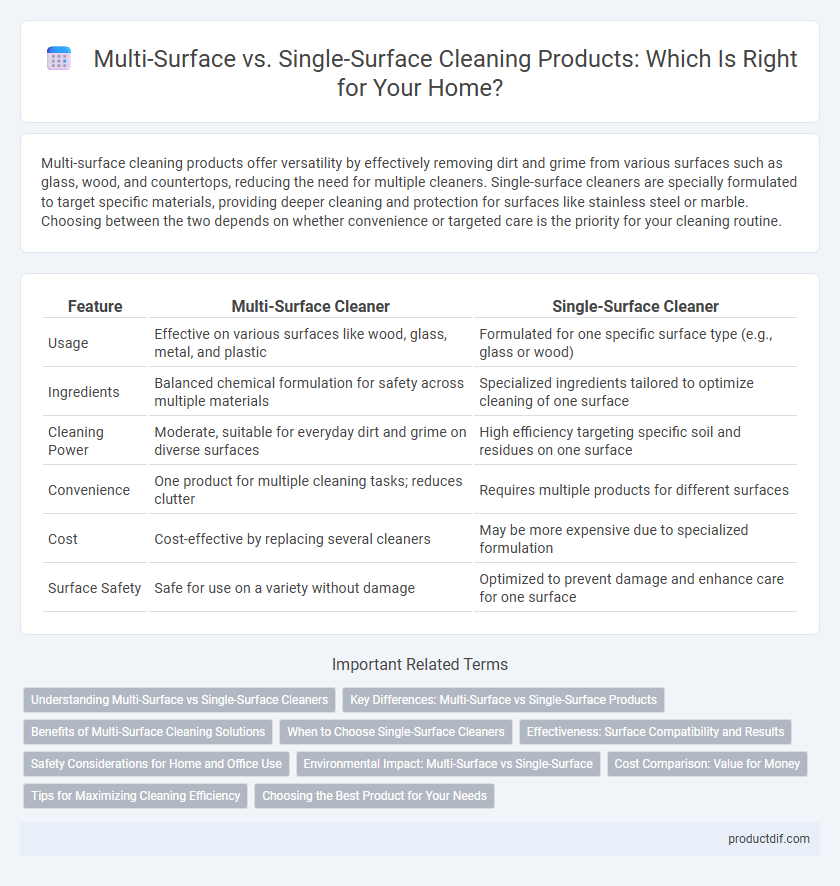Multi-surface cleaning products offer versatility by effectively removing dirt and grime from various surfaces such as glass, wood, and countertops, reducing the need for multiple cleaners. Single-surface cleaners are specially formulated to target specific materials, providing deeper cleaning and protection for surfaces like stainless steel or marble. Choosing between the two depends on whether convenience or targeted care is the priority for your cleaning routine.
Table of Comparison
| Feature | Multi-Surface Cleaner | Single-Surface Cleaner |
|---|---|---|
| Usage | Effective on various surfaces like wood, glass, metal, and plastic | Formulated for one specific surface type (e.g., glass or wood) |
| Ingredients | Balanced chemical formulation for safety across multiple materials | Specialized ingredients tailored to optimize cleaning of one surface |
| Cleaning Power | Moderate, suitable for everyday dirt and grime on diverse surfaces | High efficiency targeting specific soil and residues on one surface |
| Convenience | One product for multiple cleaning tasks; reduces clutter | Requires multiple products for different surfaces |
| Cost | Cost-effective by replacing several cleaners | May be more expensive due to specialized formulation |
| Surface Safety | Safe for use on a variety without damage | Optimized to prevent damage and enhance care for one surface |
Understanding Multi-Surface vs Single-Surface Cleaners
Multi-surface cleaners are formulated to effectively clean a variety of surfaces such as wood, glass, metal, and plastic, offering versatility and convenience for everyday cleaning tasks. Single-surface cleaners target specific materials with tailored ingredients optimized for delicate or stubborn stains, ensuring deep cleaning without damaging the surface. Choosing between multi-surface and single-surface cleaners depends on the variety of cleaning needs, surface types, and desired cleaning performance to maintain optimal hygiene and surface integrity.
Key Differences: Multi-Surface vs Single-Surface Products
Multi-surface cleaning products are formulated with versatile agents designed to safely and effectively clean a variety of materials such as wood, glass, metal, and plastic, reducing the need for multiple cleaners. Single-surface products target specific materials, often containing specialized ingredients tailored for optimal performance and protection, like ammonia-based glass cleaners or oil-degrading wood polishes. The key difference lies in their formulation specificity and application scope, with multi-surface options offering convenience and broad usability, while single-surface cleaners provide superior results for dedicated surfaces.
Benefits of Multi-Surface Cleaning Solutions
Multi-surface cleaning solutions offer versatile performance by effectively removing dirt, grime, and bacteria from various surfaces such as glass, wood, tile, and metal, reducing the need for multiple specialized products. These all-in-one cleaners save time and storage space while ensuring consistent cleanliness across different home or office environments. Formulated to be safe and non-damaging on diverse materials, multi-surface cleaners help maintain the integrity and appearance of surfaces longer than single-surface products.
When to Choose Single-Surface Cleaners
Single-surface cleaners are ideal for tackling specific materials such as glass, wood, or stainless steel, ensuring optimal cleaning without damage. Choosing a single-surface cleaner is essential when residue, streaks, or surface sensitivity require targeted formulas designed to preserve the integrity and finish. For homes with delicate surfaces or specialized appliances, single-surface products deliver precise results and prevent the risk of cross-contamination inherent in multi-surface solutions.
Effectiveness: Surface Compatibility and Results
Multi-surface cleaning products provide broad surface compatibility, effectively removing dirt, grease, and stains from diverse materials like glass, wood, and tile without causing damage. Single-surface cleaners are specifically formulated to maximize efficacy on one type of surface, often delivering stronger, targeted results but limiting versatility. Choosing between them depends on the cleaning requirements, balancing the desire for convenience against the need for specialized performance on particular surfaces.
Safety Considerations for Home and Office Use
Multi-surface cleaners offer convenience but may contain stronger chemicals to effectively clean various materials, requiring careful handling to avoid harmful residues on sensitive surfaces or skin. Single-surface products are often formulated to be gentler and more targeted, reducing the risk of damage or allergic reactions, especially in homes with children or pets. Choosing the right cleaner involves evaluating ingredient safety, ventilation needs, and compliance with health standards to ensure safe use in both home and office environments.
Environmental Impact: Multi-Surface vs Single-Surface
Multi-surface cleaning products reduce overall environmental impact by minimizing the need for multiple specialized formulas, leading to less packaging waste and lower resource consumption during production. Single-surface cleaners may require more frequent purchases and diverse chemical compositions, increasing ecological footprint through higher plastic use and chemical runoff risks. Choosing multi-surface options supports sustainable practices by promoting efficient use of materials and reducing chemical exposure in ecosystems.
Cost Comparison: Value for Money
Multi-surface cleaning products offer cost-effective value by eliminating the need to buy separate cleaners for different surfaces, reducing overall household expenses. Single-surface cleaners may provide specialized formulations but often result in higher cumulative costs when multiple types are required. Evaluating price per use and versatility highlights that multi-surface options deliver better long-term savings for diverse cleaning tasks.
Tips for Maximizing Cleaning Efficiency
Choose multi-surface cleaners with pH-balanced formulas to effectively tackle dirt on various materials like glass, wood, and laminate without causing damage. For single-surface cleaners, use products specifically designed for the targeted material, such as stainless steel or granite, to ensure optimal stain removal and surface care. Maximize cleaning efficiency by using microfiber cloths that trap dirt and minimize streaks regardless of the cleaning solution applied.
Choosing the Best Product for Your Needs
Choosing the best cleaning product depends on the surfaces you need to treat and the level of cleaning required. Multi-surface cleaners offer versatility by effectively removing dirt and stains from various materials such as wood, glass, and tile, making them ideal for general household use. Single-surface cleaners provide specialized formulas designed to target specific surfaces like granite or stainless steel, ensuring deeper cleaning without damage.
Multi-surface vs Single-surface Infographic

 productdif.com
productdif.com